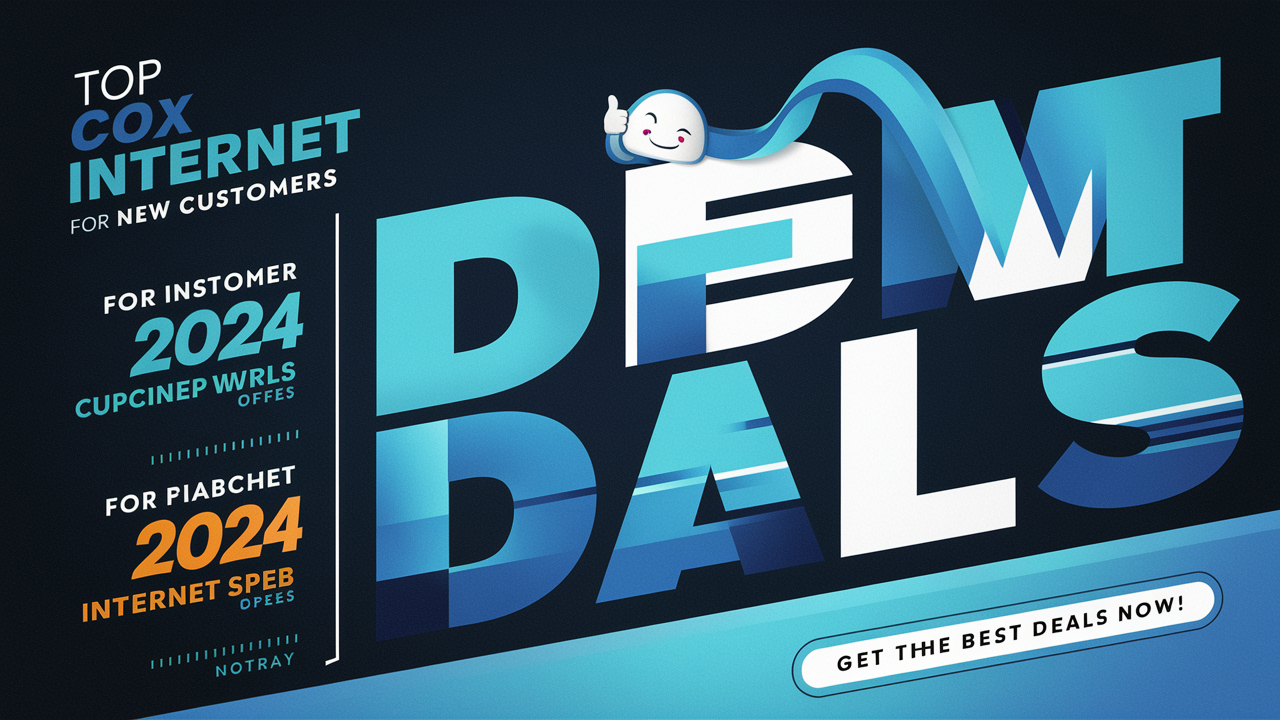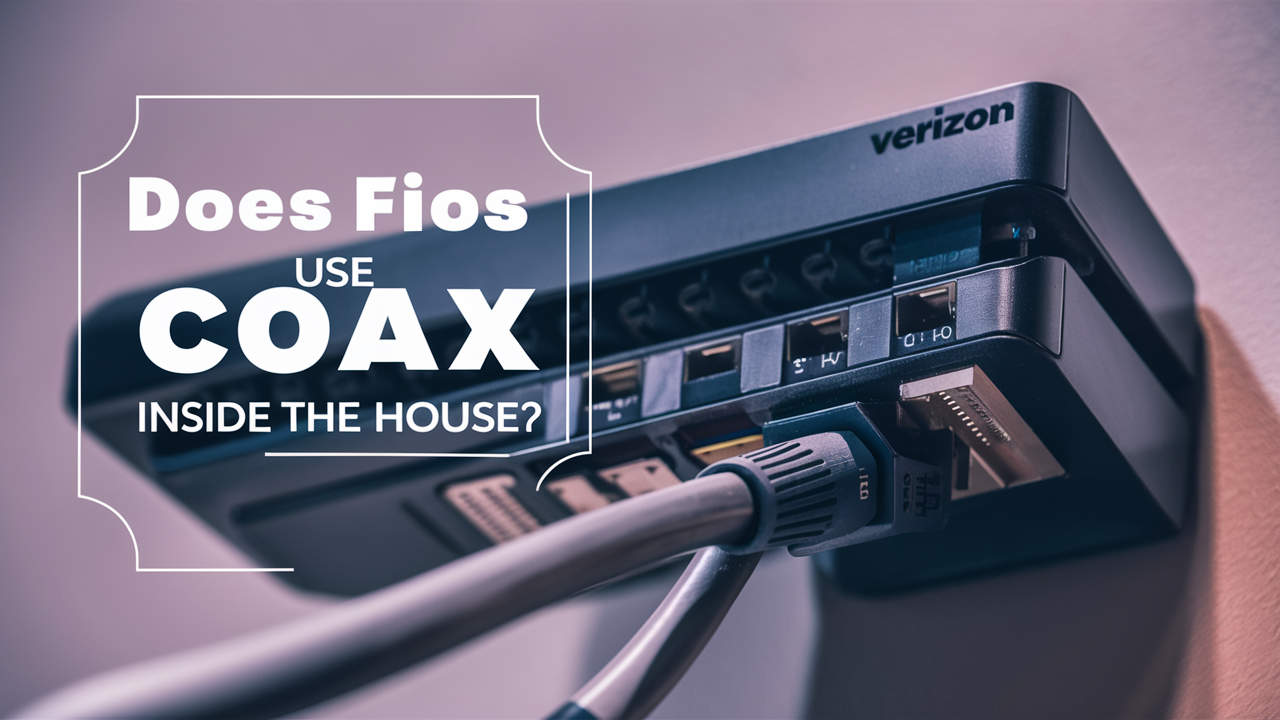Does Cox WIFI have a Limit?

Does Cox WIFI have a data limit in 2025? This comprehensive guide explores Cox's internet data policies, explaining unlimited data options, potential overage charges, and strategies to manage your usage. Understand what "unlimited" truly means with Cox and how to avoid unexpected fees for a seamless online experience.
Understanding Cox Internet Data Policies: The Burning Question
In the ever-evolving digital landscape of 2025, reliable internet access is no longer a luxury but a fundamental necessity. From remote work and online education to streaming entertainment and staying connected with loved ones, our daily lives are intrinsically linked to our internet connectivity. This makes understanding the nuances of internet service provider (ISP) policies, particularly regarding data usage, critically important. One of the most frequently asked questions by Cox Communications customers, and indeed by many internet users, revolves around data limits: "Does Cox WIFI have a limit?" This question is not just about a simple yes or no; it delves into the complexities of data caps, unlimited data plans, and the potential financial implications of exceeding usage thresholds. As we navigate the digital age, where streaming 4K content, downloading large files, and participating in video conferences are commonplace, the concern over data consumption is more relevant than ever. This article aims to provide a comprehensive, up-to-date (as of 2025) exploration of Cox's data policies, demystifying their "unlimited" offerings, explaining how to monitor your usage, and offering practical advice to ensure you can enjoy your online activities without unexpected surprises.
The concept of data limits, often referred to as data caps, has been a point of contention for consumers for years. ISPs implement these caps for various reasons, including network management and to encourage users to select plans that better suit their typical usage. However, for many households in 2025, with multiple devices simultaneously streaming, gaming, and working from home, these caps can feel restrictive. Cox, like many major ISPs, has a history of implementing data policies that can be confusing. While they have increasingly marketed "unlimited" data plans, the definition and application of "unlimited" in the ISP world often come with caveats. Understanding these nuances is key to avoiding potential throttling of your internet speed or incurring extra charges. This guide will break down Cox's approach to data limits, providing clarity and actionable insights for all Cox internet subscribers.
Cox's "Unlimited" Data: What It Really Means in 2025
The term "unlimited data" is a powerful marketing tool, but in the context of internet service providers like Cox in 2025, it's crucial to understand the underlying policies. Cox offers various internet plans, and many are advertised with "unlimited data." However, this often means that while you won't be charged overage fees, your speeds might be temporarily reduced (throttled) if you exceed a certain high-usage threshold within a billing cycle. This threshold is typically quite generous, designed to accommodate the vast majority of residential users, even those with heavy internet habits.
The Fair Usage Policy and Throttling
Cox's approach to "unlimited" data generally falls under a Fair Usage Policy. This policy aims to ensure that all customers have a consistent and satisfactory internet experience. In essence, it states that if a customer's data usage significantly exceeds that of typical users, Cox reserves the right to manage their network traffic. For most residential customers, this means you can stream, game, and browse without worrying about hitting a hard data cap that incurs extra fees. However, if your usage is exceptionally high – for example, consistently using hundreds of gigabytes or even terabytes of data per month beyond what's considered normal – Cox may implement temporary speed reductions. This throttling is typically reinstated at the start of the next billing cycle.
Typical Data Thresholds for "Unlimited" Plans
While Cox doesn't always publicly advertise a specific number for their "unlimited" threshold, industry standards and customer reports in 2025 suggest that this threshold is often set at or above 2.5 Terabytes (TB) per month. For context, 2.5 TB is an enormous amount of data. To put it into perspective:
- Streaming 4K video for 100 hours consumes approximately 100 GB.
- Downloading a large AAA video game (around 100 GB) would use 10% of this threshold.
- A family of four engaging in moderate streaming, browsing, and some online gaming would likely not even approach this limit.
Therefore, for the vast majority of households, Cox's "unlimited" data plans effectively function as truly unlimited, without the fear of overage charges or significant throttling. It's primarily intended to deter extreme, commercial-level usage on residential plans.
Plans Without Unlimited Data
It's important to note that not all Cox internet plans necessarily come with unlimited data. Some of their introductory or lower-tier plans might still have a traditional data cap. If you are on such a plan, exceeding this cap will likely result in either overage fees or a significant reduction in speed until the next billing cycle. It is crucial to check the specific terms and conditions of your Cox internet plan to understand its data policy.
Data Usage: How Much Do You Actually Need in 2025?
To truly understand if Cox's data policies are sufficient for your needs, it's essential to have a realistic grasp of how much data different online activities consume in 2025. With the increasing prevalence of high-definition content and bandwidth-intensive applications, data usage has steadily climbed. Here's a breakdown of typical data consumption for various activities:
Streaming Services (Netflix, Hulu, YouTube, etc.)
Streaming remains one of the biggest data consumers. The amount of data used depends heavily on the video quality:
- Standard Definition (SD): Approximately 0.7 GB per hour.
- High Definition (HD): Approximately 3 GB per hour.
- Ultra High Definition (4K UHD): Approximately 7 GB per hour.
A family watching several hours of HD content daily can easily consume several hundred gigabytes per month. Heavy 4K streaming for multiple users could push usage towards or even beyond 1 TB per month.
Online Gaming
Gaming itself, the act of playing online, is relatively light on data. However, downloading game updates and new titles can be massive data consumers:
- Online Gameplay: Varies, but typically 50 MB to 300 MB per hour.
- Downloading Games/Updates: Can range from 10 GB to over 150 GB for a single large game or significant update.
For gamers who frequently download new games or large updates, this can add up significantly. A few large game downloads could consume a substantial portion of a data cap.
Video Conferencing and Online Meetings
With the continued rise of remote work and virtual communication, video conferencing is a daily activity for many:
- Standard Video Call: Approximately 0.5 GB to 1.5 GB per hour.
- HD Video Call: Can be 2 GB to 3 GB per hour or more.
Multiple hours of daily video calls for work or personal use can add up to 100-200 GB per month per user.
Web Browsing and Social Media
These activities are generally lighter, but can still contribute:
- Web Browsing: Varies greatly, but typically 50 MB to 150 MB per hour.
- Social Media (with video): Can range from 100 MB to 500 MB per hour.
While not primary data hogs, constant browsing and social media use across multiple devices can add up over a month.
Smart Home Devices and IoT
With the proliferation of smart speakers, security cameras, and other Internet of Things (IoT) devices, background data usage is becoming more significant:
- Smart Speakers/Assistants: Low, but constant.
- Security Cameras (streaming): Can consume 10-50 GB per month per camera, depending on resolution and recording frequency.
While individual devices are low, a network with several smart devices can contribute a noticeable amount to your monthly data usage.
File Downloads and Cloud Storage
Downloading large files (software, documents, media) or syncing large amounts of data to cloud services (like Google Drive, Dropbox, iCloud) can be extremely data-intensive. A single large file download can easily consume tens or hundreds of gigabytes.
By estimating your household's typical usage for these activities, you can better gauge whether Cox's "unlimited" policy is truly sufficient or if you need to be more mindful of your consumption. For most households in 2025, the 2.5 TB threshold is more than enough, but understanding these figures is empowering.
Navigating Cox Data Caps: Potential Overage Charges and Fees
While many Cox internet plans in 2025 offer "unlimited" data, it's crucial to reiterate that not all plans are structured this way. If your specific Cox plan does have a traditional data cap, understanding the potential overage charges is vital to avoid unexpected costs. Historically, ISPs have charged a per-gigabyte fee for data used beyond the allotted cap. These fees can add up quickly, turning a seemingly affordable internet bill into a significant expense.
How Overage Charges Work
If your plan has a data cap (e.g., 1 TB), and you exceed it within your billing cycle, Cox will typically notify you. Depending on the plan and region, the consequences can vary:
- Overage Fees: You might be charged a set fee for every gigabyte (or block of gigabytes) you go over. These fees can range from $10 to $50 per 50 GB or 100 GB block, for example.
- Speed Throttling: Even on plans with caps, exceeding the limit might result in your internet speeds being drastically reduced for the remainder of the billing cycle, making your internet practically unusable for streaming or heavy browsing.
- Service Suspension: In extreme cases of repeated overages, an ISP might even suspend service, though this is rare for residential customers.
It is imperative to consult your specific Cox service agreement or contact customer support to understand the exact overage policy for your plan. These policies can differ by location and the specific package you subscribe to.
Monitoring Your Data Usage
The best way to avoid overage charges is to actively monitor your data usage. Cox provides tools for this:
- Cox Website/App: Log in to your Cox account online or use the Cox app. You can usually find a section dedicated to your current data usage for the billing cycle. This is the most reliable way to track your consumption.
- Automated Alerts: Cox may offer to send you notifications via email or text message when you are approaching your data limit. Ensure these alerts are enabled in your account settings.
Proactive monitoring allows you to adjust your internet habits if you see your usage climbing towards the cap. For instance, you might opt for downloading large files during off-peak hours or switch to Wi-Fi calling for extended conversations.
Transitioning to an Unlimited Plan
If you consistently find yourself nearing or exceeding your data cap on a limited plan, the most straightforward solution is to upgrade to a Cox plan that offers truly unlimited data or a significantly higher data allowance. While this might come with a slightly higher monthly cost, it often proves more economical than paying recurring overage fees and provides peace of mind. When considering an upgrade, compare the cost of the unlimited plan against your typical overage charges from the past few months to see the savings.
Strategies for Managing Your Cox Data Usage
Whether you have an "unlimited" plan with a high-usage threshold or a plan with a strict data cap, adopting smart data management strategies can help you stay within your limits, avoid potential throttling, and ensure a smoother online experience. In 2025, with data-hungry applications and services, these habits are more important than ever.
Optimize Streaming Habits
Streaming services are major data consumers. Consider these tips:
- Adjust Video Quality: Most streaming platforms allow you to select the video quality. If you're not actively watching on a large 4K screen, or if you're on a device with a smaller screen, opt for HD or even SD quality to significantly reduce data usage.
- Download Content for Offline Viewing: Services like Netflix, Amazon Prime Video, and Disney+ allow you to download movies and shows to your device when connected to Wi-Fi. This is ideal for long commutes or travel, consuming no data from your home internet plan.
- Limit Background Streaming: Ensure that apps aren't streaming content in the background when you're not actively using them.
Manage Online Gaming Downloads
Game downloads and updates can be massive. To manage this:
- Schedule Downloads: Utilize the download scheduling features in game launchers (like Steam, Epic Games Store) to download large files overnight or during off-peak hours when network congestion is lower, and your usage is less likely to impact other household activities.
- Delete Unused Games: Regularly uninstall games you're no longer playing to free up storage space and prevent accidental re-downloads of massive files.
Optimize Video Conferencing
For remote workers and students:
- Turn Off Video When Not Necessary: If you're in a meeting where only audio is required, or if you're stepping away, turn off your video feed.
- Use Lower Resolution: If your video conferencing software allows, choose a lower resolution for your video calls if bandwidth is a concern.
Monitor Background Data Usage
Many devices and applications consume data even when you're not actively using them:
- Update Software Over Wi-Fi: Configure your devices (smartphones, tablets, computers) to download operating system and app updates only when connected to Wi-Fi.
- Limit Smart Device Activity: If you have many smart home devices, consider if they all need to be actively streaming or uploading data constantly. Some cameras allow you to adjust recording frequency or quality.
- Disable Auto-Play Videos: On social media platforms and some websites, disable the auto-play feature for videos.
Utilize Network Monitoring Tools
Your router might have built-in tools to monitor data usage per device on your network. Additionally, some third-party apps can help you track which devices are consuming the most data, allowing you to identify and manage the biggest culprits.
Consider a More Robust Plan
If, despite your best efforts, you consistently struggle with data limits, it might be time to re-evaluate your internet plan. As mentioned, upgrading to a plan with a higher data allowance or an unlimited data policy is often the most effective long-term solution.
Cox Internet Plans and Their Data Implications
Cox offers a range of internet plans designed to meet different user needs and budgets. The data implications of these plans can vary significantly. As of 2025, here's a general overview of how Cox's plans typically align with data usage:
| Plan Tier (Example) | Typical Download Speeds | Data Policy (General) | Best For |
|---|---|---|---|
| Essential Internet / Cox StraightUp Internet | Up to 100 Mbps | Often has a traditional data cap (e.g., 1.25 TB) or may offer an unlimited option at a higher price. | Light users, single individuals, basic browsing, occasional streaming. |
| Preferred Internet | Up to 500 Mbps | Likely to be "unlimited" with a high threshold (e.g., 2.5 TB), or a higher cap if limited. | Average households, moderate streaming, some online gaming, work-from-home. |
| Gigablast / Ultimate Internet | 1 Gig Mbps or higher | Almost always "unlimited" with a very high threshold (e.g., 2.5 TB or more), designed for heavy usage. | Heavy users, large families, multiple simultaneous 4K streamers, extensive online gaming, heavy downloaders. |
Important Considerations:
- Regional Variations: Data policies and plan availability can vary significantly by geographic location within Cox's service area. Always check what's offered in your specific zip code.
- Promotional Offers: Cox frequently runs promotions that might include temporary waivers of data caps or unlimited data. Read the fine print carefully to understand when these promotions end and what the standard policy will be thereafter.
- Bundling: Sometimes, bundling internet with TV or phone services can affect plan options or data policies.
- "Unlimited" Thresholds: As discussed, the threshold for "unlimited" plans is generally high, often around 2.5 TB. For most users, this is effectively unlimited. However, if you are a power user who consistently exceeds this, you might still experience throttling.
When choosing a Cox internet plan, it's essential to consider not only the advertised speeds but also the data policy. If you're unsure about your current plan's data limit, log in to your Cox account or contact customer service for clarification. Making an informed decision based on your household's actual internet usage will help you select the most suitable and cost-effective plan.
Beyond Data Caps: Other Factors Affecting Your Internet Experience
While data limits are a significant concern, they are not the only factor that can impact your internet experience with Cox or any other ISP. In 2025, understanding these other elements can help you troubleshoot issues and optimize your connection.
Speed vs. Data
It's crucial to distinguish between internet speed (measured in Mbps or Gbps) and data usage (measured in GB or TB). Speed determines how quickly data can be transferred, while data usage is the total amount of data transferred over a period. A high-speed plan doesn't inherently mean unlimited data, and a plan with unlimited data might not offer the fastest speeds. Ensure your chosen plan meets both your speed and data needs.
Network Congestion
Even with an unlimited data plan, your internet speeds can fluctuate due to network congestion. This happens when too many users in your area are online simultaneously, especially during peak hours (typically evenings and weekends). Cox, like other ISPs, manages network traffic, and while they strive for consistent service, congestion can lead to temporary slowdowns that are not related to your data cap.
Equipment Quality
The modem and router you use play a significant role in your internet performance. If you're using older or outdated equipment, it might not be able to handle the speeds your Cox plan offers, or it could create Wi-Fi dead zones within your home. Cox often provides modem/router rental options, but purchasing your own compatible equipment can sometimes offer better performance and long-term savings.
Home Network Setup
The layout of your home, the number of devices connected, and the quality of your Wi-Fi signal all impact your internet experience. Thick walls, large distances from the router, and interference from other electronic devices can weaken the Wi-Fi signal. Consider using Wi-Fi extenders or a mesh Wi-Fi system for larger homes to ensure consistent connectivity.
ISP Throttling (Beyond Data Caps)
While we've focused on data cap throttling, ISPs can also throttle specific types of traffic (like peer-to-peer file sharing) or throttle speeds for customers who are consistently using extremely high bandwidth, even on "unlimited" plans, as part of their network management. This is distinct from hitting a hard data cap but is a form of speed limitation.
Customer Service and Technical Support
When you encounter issues, the quality of Cox's customer service and technical support can significantly affect your experience. Responsive and knowledgeable support can help resolve problems quickly, whether they relate to billing, data usage, or technical glitches.
By considering these additional factors alongside data policies, you can gain a more holistic understanding of your internet service and work towards optimizing your online experience with Cox.
Troubleshooting and Support for Data Concerns
If you're experiencing issues related to data usage with your Cox internet service, or if you have questions about your plan, there are several steps you can take to troubleshoot and seek support. Proactive engagement can save you time and potential frustration.
1. Verify Your Data Usage
The first step is always to confirm your current data usage. Log in to your Cox.com account or use the Cox mobile app. This is the official source for your data consumption for the current billing cycle. If you believe the reported usage is incorrect, this is your starting point for discussion with Cox.
2. Check Your Plan Details
Ensure you understand the data policy of your specific plan. Does it have a cap? What is the cap amount? What are the overage charges or throttling policies if you exceed it? This information is available in your service agreement and on your billing statements.
3. Identify High-Usage Devices/Activities
Use your router's administrative interface or third-party network monitoring tools to see which devices on your network are consuming the most data. This can help you pinpoint specific applications or devices that might be contributing to high usage unintentionally.
4. Contact Cox Customer Support
If you have questions about your data usage, believe there's an error, or want to discuss upgrading your plan, contact Cox customer support. They can provide:
- Clarification on your plan's data policy.
- Details on your current usage and historical data.
- Information on available plans with higher data allowances or unlimited data.
- Assistance with setting up data usage alerts.
- Troubleshooting for any technical issues that might be impacting your service or data reporting.
Be prepared with your account information and specific questions when you call.
5. Explore Online Resources
Cox's website often features extensive FAQs, help articles, and community forums where you can find answers to common questions about





